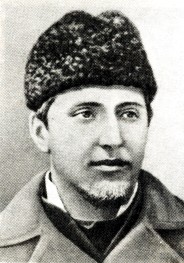Ludwik Waryński
Ludwik Tadeusz Waryński (born September 12, jul. / 24. September 1856 greg. In Martynovka , Russian Empire , now Ukraine ; † 2. March 1889 in detention at the fortress Schlüsselburg ) was a Polish politician and founder of the first Polish Workers' Party "Proletariat “(1882).
Life
His father took part in the January uprising in 1863 . From 1865 Ludwik attended high school in Bila Tserkva , and in 1874 he began studying in Saint Petersburg , which he had to break off the following year due to student unrest. In 1876 he settled in Warsaw and founded the first socialist magazine in the Russian Congress Poland . At the same time he attended the agricultural school in Pulawy , worked in Warsaw as an editor of two socialist newspapers and as a locksmith in a factory. In 1879 the tsarist police found him in Warsaw and expelled him from Russia .
He moved to Lemberg and later to Cracow , which at that time both belonged to Austrian Galicia , and continued his socialist work there. He was arrested by the Austrian police on February 8, 1879 and remained in custody until his trial in February 1880, during which he was acquitted but expelled from the country and moved to Geneva , Switzerland . Waryński wrote the so-called Brussels Program , an ideological assessment of the Polish socialists. During his stay in Switzerland he took part in an international socialist congress in Chur and met his future wife Anna Sieroszewska, with whom he had a son named Tadeusz.
In 1882 Waryński returned to Warsaw and founded the "Proletariat", the first Polish workers' party. In 1883 he was arrested by the tsarist secret police and after a trial he was sentenced to 16 years imprisonment at the Schluesselburg fortress, where he died six years later of tuberculosis .
The Polish poet Władysław Broniewski wrote an elegy about the circumstances of his death .
| personal data | |
|---|---|
| SURNAME | Waryński, Ludwik |
| ALTERNATIVE NAMES | Waryński, Ludwik Tadeusz |
| BRIEF DESCRIPTION | Polish politician |
| DATE OF BIRTH | September 24, 1856 |
| PLACE OF BIRTH | Martynówka , Ukraine |
| DATE OF DEATH | March 2, 1889 |
| Place of death | Shlisselburg Fortress |
